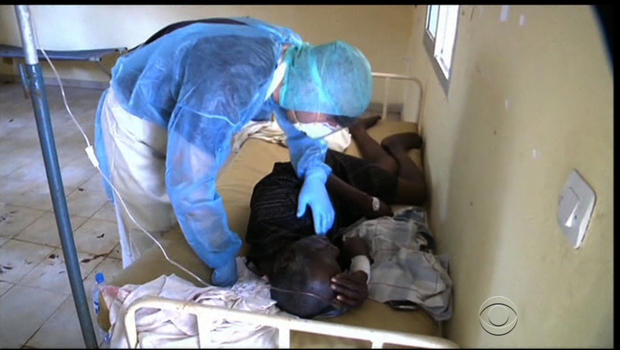350 people in West Africa have died from Ebola since the beginning of the year – more than ever before. Experts are trying to contain the fatal virus that has spread from Guinea to Sierra Leone and Liberia.
It seems as though the Ebola epidemic in West Africa is turning into a regional catastrophe. The disease appeared there at the end of 2013 for the first time and the virus has now spread from Guinea to Sierra Leone and Liberia. 60 centers of infection have been identified so far. According to Bart Janssen of Doctors Without Borders /Medicins Sans Frontieres (MSF), "The epidemic is out of control. As new centers emerge, the risk of a spread to other regions is very real at present."
With 350 deaths, the epidemic has reached a new dimension. 280 people died during the last epidemic in 1976 in Zaire (now Democratic Republic of Congo) when the virus was initially discovered and named. Since then there have been small outbreaks in Central Africa. But this time the epidemic has spread across three borders, posing new challenges for the helpers on the ground.
Ape and rat meat not safe
The respective governments have been trying to prevent the disease from spreading any further. In Guinea authorities have banned the consumption and sale of meat from wild animals.
Wild animal meat may carry the Ebola pathogen.
Ape, bat, antelope and rat are regarded as delicacies but all of them bear the risk of potentially transmitting the Ebola pathogen. People from other parts of the country often travel to the affected regions to buy the meat of animals living in the wild and this could result in an even wider spread of the disease.
Stephan Becker is the head of the department for virology at Marburg University in Germany. He believes many people contract the disease at funerals where the deceased have died of Ebola. When the dead are washed and prepared for the funeral, the bodies are often embraced by relatives. Such personal contact may result in an infection as the fatal virus is transmitted through blood and other bodily fluids.
Skepticism within the population
Some of Becker's colleagues have been in West Africa for months to help in the fight against Ebola. The German scientists have been visiting villages to test sick people for the virus as part of the European Mobile Laboratory Project. This is very important as infected people should not be nursed at home but taken to a quarantine facility. Infected corpses should be buried with special care and without being touched. These precautions are necessary to stop further infections and to contain the epidemic.
"We see that the population do not trust us," Becker told DW. "The people in the villages don't believe in a virus infection. They think it is a curse – and for that Western medicine is useless in their eyes," he said. Many people also feared they were signing their own death warrant if they agreed to go to quarantine facilities.
60 percent of all people infected with Ebola die – but up to 40 percent could be saved, Becker stresses. "It is certain that we can help people much better with intensive medical care than if they stay at home."
However, aid workers must fight not only the Ebola virus but also the population's skepticism.
The Ebola virus
For Stephan Becker the key lies in educational campaigns and in training more local staff who could join foreign experts in performing the Ebola tests and explain the risks of infection. According to Becker, the present epidemic is far from over. "I assume this situation will continue for several months", he told DW
.
No vaccine to this day
The Ebola experts from Marburg who are now in West Africa are reinforced by MSF which has 300 specialists in the region. Guinea, the country that has been hit hardest, is the main area of operations. Ebola is one of the most highly infectious diseases in the world – for which there is no efficient vaccine.
Credit: http://www.dw.de/africa
Photo Credit: www.cbsnews.com

